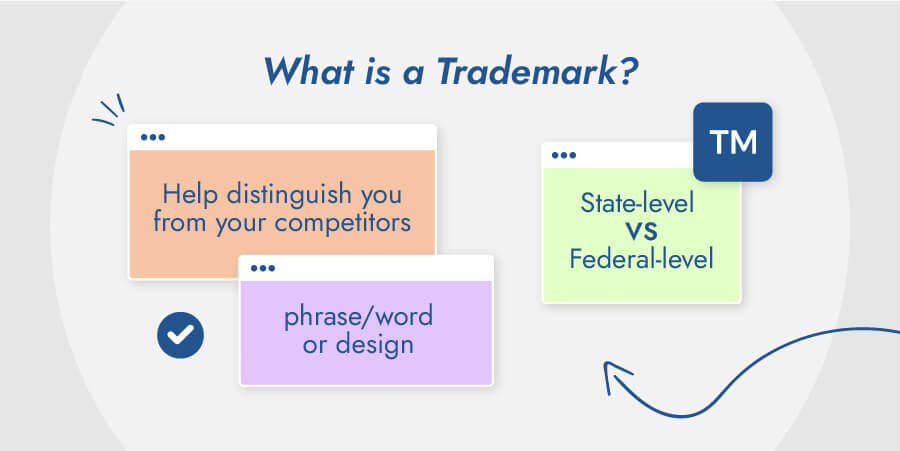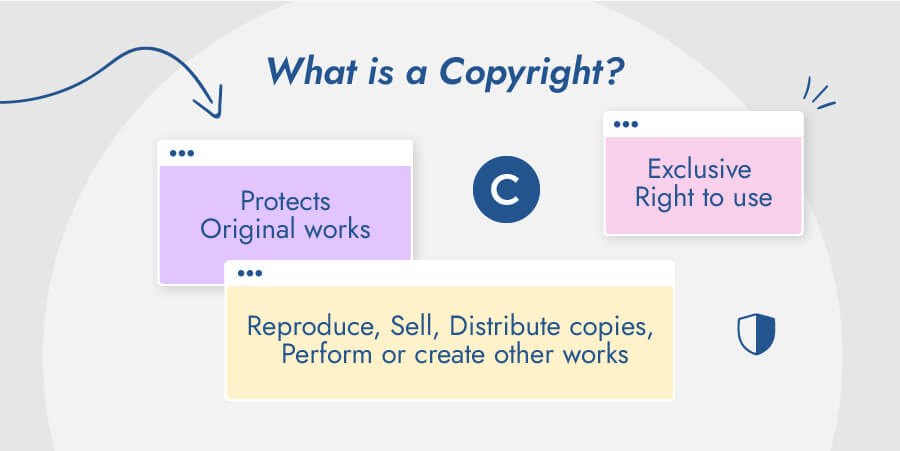Your business’s intellectual property may be one of the most valuable assets of your business. It’s important to understand how to protect your business and this important asset.
Intellectual property covers a range of materials including the mark which your company uses to enable customers and potential customers to easily identify your company, the processes your company uses to create its product, and even the materials you create for your marketing campaigns.
What are the Differences Between Trademarks, Copyright, and Patent?
One of the most important things you should understand is what each of these protections are and what you can do to protect them. You should also be aware of the limitations placed on them.
Here’s a quick look at what each offers:
Trademarks
These include the design of your business logo. It may be a phrase, word, or symbol which is unique to your business.
Protections are fairly simple, you merely need to continue to use the same trademark when you are marketing your business or referring to your business in any type of commerce. As long as you continue to use a trademark, it doesn’t expire.
Patents
Patents are designed to specifically protect an invention which is unique to your business. This could be a specific formula you use to create a product, provided it’s not something anyone with similar knowledge could create on their own.
Patents also provide protection for improvements to the invention. A patent is good for 20 years after it has been registered.
Copyright
Copyrights are used specifically to protect creative works. For your business, this could mean a specific written brochure outlining your products. It may also be part of your business’s trademark. In some instances, a trademark can have both a trademark and a copyright.
It’s vitally important you’re certain what level of protection you need for your intellectual property. Failing to have the right protection can be costly.
Here’s a more detailed outline of what you need to know:
What is a Trademark?

Specifically, a trademark is a mark which is known to represent your company. Trademarks are generally used to designate goods. When the mark is used to designate a service, it’s known as a service mark.
What does a trademark protect?
Trademarks (and service marks) protect your business’s logo, which is typically associated with your brand. It’s important that your trademark be attached to your goods. For example, if you are selling widgets, your trademark must be on the product.
What are the requirements to register a trademark?
Registration of a trademark requires you to take several steps. While there are multiple levels for a trademark (local, state, and federal), the best protection you can get is at the federal level. To obtain a trademark which protects you in the U.S., you should take the following steps:
- Search for similar trademarks:
Your trademark must be unique to your business and must not infringe upon another trademark.
For example, if your business name is Murphy, Miles, and Monty, you can’t use 3M because that’s an existing trademark of another company. You can easily do a search of existing trademarks to ensure yours is unique. - Fill out the application:
You can fill out the required applications online using the MyUSPTO system and track the progress of approvals. This system also allows you to respond to inquiries regarding your trademark. Make sure you carefully review the requirements prior to submission so you are not facing unnecessary delays or denials.
Remember, your trademark is good for as long as you continue to use it as part of your business. Should you abandon the use of the trademark, it will be inactive and available for anyone else to use.
However, once you register a trademark, you’ll also have to maintain that registration. This will include being able to demonstrate you are actively using the trademark.
Filings are required between year 5 and year 6 after your registration date. Declarations must be filed between the 9th and 10th year following registration and then every 10 years following that.
Should you enter a period of non-use, you must also file an Excusable Nonuse Declaration followed by an Application for Renewal. Any products which are no longer being used with your trademark should be eliminated from your list of products in a timely fashion or you could incur additional fees for deletion.
What is a Copyright?

Copyrights protect written works in most cases. The more comprehensive explanation of what a copyright is offered by the U.S. Copyright office which states “…a type of intellectual property that protects original works of authorship as soon as an author fixes the work in a tangible form of expression.”
What does a copyright protect?
Once again, the best definition comes from the source. According to the U.S. Copyright Office, “literary, dramatic, musical, and artistic works, such as poetry, novels, movies, songs, computer software, and architecture” may all be protected by copyrights. These protections may include website content, blogs, and other online content as well.
Remember, only works which are your creation, or works which you created in conjunction which are unique, are eligible for copyright protection. These works can also include scripts, stories, poetry, illustrations, and more.
What is not protected by copyright?
You can’t protect recipes, lists of ingredients, or short phrases, slogans, names, or titles. These are prohibited under copyright laws even when they are your property.
Whenever you are in doubt, you may investigate any questions you may have about whether your intellectual property can be protected by a copyright on the U.S. Copyright Office website.
What are the requirements to obtain a copyright?
Title 17 of the United States Code allows you to register any works which you are claiming ownership of through the U.S. Copyright Office.
To do so, you can use the online registration system. This system will allow you to upload specific documentation showing you own the work which you are claiming the copyright for. There are fees (of course) associated with these filings.
You can also register by downloading the appropriate forms for copyrights including:
- Literary Form TX
- Visual Form VA
- Single Serials Form SE
- Performing Arts Form PA
- Sound Recording Form SR
These forms must be mailed in with the appropriate fees when submitting so there are no delays. In most cases, you can save time and money by using the online registration portals for your copyright needs.
You should also understand what registering a new copyright offers in terms of length of protection. These are different when there is more than one author who shares the right to a specific work.
Here’s what you should know:
Solely owned work: If you own the work solely, then your copyright protection begins once you have completed the work (even prior to registering). Your copyright will be valid for 70 years following your death.
Jointly owned work: If the work had multiple authors then the copyright is valid until 70 years after the death of the last surviving author.
Work for hire: Any work that’s created using an anonymous name as the author or a pseudonym. Then the work is protected for 95 years from publication or 120 years from the date of creation, whichever occurs first.
Copyrighting does not require you to renew after a specific period of time. Once you have applied for a copyright it’s good until expiration.
In Conclusion
Ownership of a trademark, copyright, or patent provides business owners with advantages over their competitors. This is particularly true today when we are in an environment where technology advances matter greatly in the pursuit of building a business.
The protection of your intellectual property starts with proper registration. Without the registration, you can’t expect a court to take a claim of abuse of misuse of your intellectual property seriously.
You can protect yourself from some forms of misuse by making use of non-disclosure agreements and confidentiality agreements. However, the best possible protection is always making sure you have taken every legal step to ensure that everyone knows the property is yours in the first place.
While it may feel time consuming and costly on the front end, should there come a time when you are selling your business or need to prove the value of your company, your intellectual property is invaluable in demonstrating your company’s worth.
